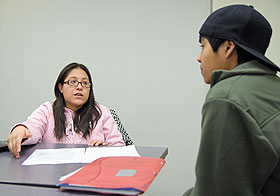  |
| HOME | THIS ISSUE | CALENDAR | GRANTS | BACK ISSUES | < BACK | NEXT > |
Academic Achievement Center helps students hone study skillsby Sherry Fisher - March 23, 2009
|
||||
| Students who want to improve their academic skills and strategies have a new place to go for help: the Academic Achievement Center. The Center, part of the Office for First Year Programs and Learning Communities, is located in the CUE Building, Room 130. Hours are Monday through Thursday, from 5 to 9 p.m. Students may come on a walk-in basis, and are coached individually or in small groups. The Center is staffed by undergraduate coaches, who take a course that teaches them how to mentor other students in basic skills and strategies. The training course is taught by Kevin Sullivan, director of academic support. Sullivan says the Academic Achievement Center was created to help all students, not just those who are struggling or may be on probation. It also, for example, serves students who need to perform at the highest levels to be eligible for competitive scholarships, majors, or postgraduate opportunities. “There are many bright students at the University who want to enhance their performance,” Sullivan says. “Many don’t do well on tests, some have time management issues, and others have problems managing stress. Our goal is to help them develop the knowledge, attitudes, and behaviors so they can achieve at the highest levels.” The Academic Achievement Center operates on a combination of existing resources, and builds on the First Year Programs, UConn Connects, and campus peer education programs, including the First Year Experience mentor initiative. Sullivan, who has counseled students at UConn for some 20 years, says undergraduates or graduate students who are new at the University often get a shock after the first round of exams. Objective tests, which measure both a person’s understanding and memory for details, are particularly problematic. “They might not do well on a multiple choice test, even though they believe they’ve studied appropriately,” says Sullivan. “When they get a bad grade, they’ll often think they are not suited for college work and become discouraged. That’s where the Center for Academic Achievement steps in.” Faculty, advisors, and peers have been referring students to the Center since it opened earlier this semester. Sullivan says the typical students he sees say they went to every class and studied the material. “But when you sit them down and ask them how they studied and how they prepared, you can understand why they didn’t do well.” It’s not that they haven’t worked hard, he says: They haven’t worked “smart.”
One of the first things a coach wants to see is a student’s notes. “There’s usually a real problem here,” Sullivan says. “Students may have downloaded a PowerPoint presentation from a course and think that’s enough information. It’s not.” Students need to take better notes during classes, he says. “Even if a professor puts up verbatim notes, and a student listens in class, if he or she isn’t really actively engaged in the learning process, they’re not going to understand the material. They’re not writing down things that strike them as important.” Coaches tell students they need to understand what’s required of them. “They need to know what their job is when they go to class, what their job is when they go over their notes, and what their job is when they read a chapter in a journal, says Sullivan. “We’re teaching them the trade.” He adds, “We’re trying to get them to be more conscious and intentional about how they study.” In addition to understanding the information they’re studying, reviewing it multiple times in a focused manner is important. Studying with a classmate and creating questions and answers about the subject matter is also helpful in understanding and remembering the material, Sullivan says. If additional help is needed, a student will be referred to the appropriate academic department, the Q-Center, the Writing Center, or other campus resources. Sarah Melchior, a junior majoring in English and philosophy, supervises the student coaches and also works one-on-one with students who come to the Center. She has been an FYE mentor, a UConn Connects facilitator, and a peer leadership instructor. She decided to work with the Center because, she says, peer education works. “I’ve enjoyed being a resource for other students,” she adds. “I’ve been able to succeed here, and I want to share that with other students.” |
| ADVANCE HOME |

